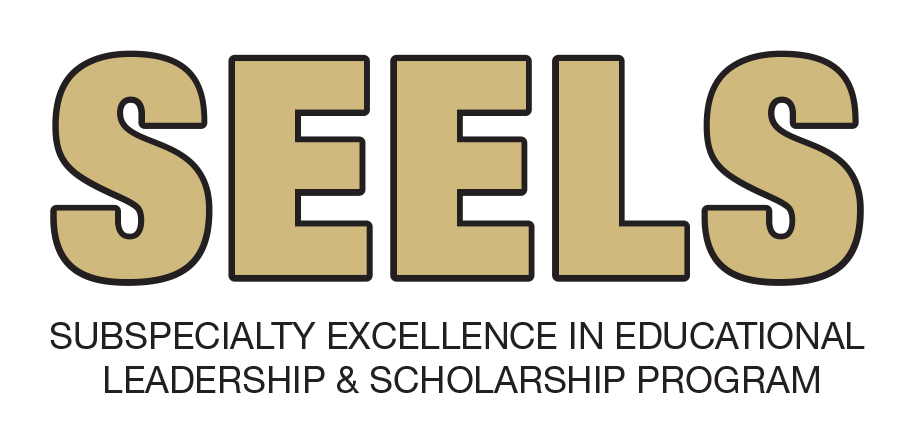
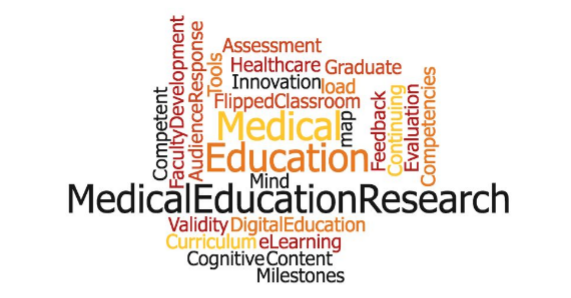
The mission of the Department of Pediatrics at the University of Colorado School of Medicine and Children's Hospital Colorado is to improve the health of children through the provision of high-quality, coordinated programs of patient care, education, research, and advocacy. The University of Colorado Department of Pediatrics’ SEELS Program offers dedicated research mentorship, coaching, and instruction for subspecialty pediatric fellows committed to an academic career in medical education.
The goal of SEELS is to equip these fellows with the necessary knowledge/skills/attitudes for success as future medical educators through educational scholarship and professional identity development, faculty and peer mentorship, and engaging in an educational community of practice.
Congratulations to the Graduates of Our First Cohort!
L-R: Maria Fouad Abou Nader, Alison Celello, Cristina Saez, Pablo Napky Raudales
Congratulations to 2026 Western Group on Education Affairs Grant Recipient Juhee Patel
Project Title: "From Identity to Specialty: How Longitudinal Integrated Clerkships Shape Professional Identity Formation and Specialty Choice"
Congratulations to 2025 Western Region Association of Pediatric Program Directors Grant Recipients
L-R: Jessica Frelinger, Ashley Cowan
SEELS Fellows - Spring 2025
SEELS Fellows Spring 2025
SEELS Fellows Spring 2025
SEELS Fellows Spring 2025
SEELS Fellows Spring 2025
SEELS Fellows Spring 2025
The goal of SEELS is to equip pediatric subspecialty fellows with the necessary knowledge/skills/attitudes for success as future medical educators through educational scholarship and professional identity development, faculty and peer mentorship, and engaging in an educational community of practice.
SEELS scholars will complete this 2-year program that typically begins during the second year of fellowship for three-year fellowship programs. The curriculum will include in-person educational sessions for the first 12 months, along with self-directed independent study, a scholarly project, and mentorship throughout the entire program. Educational content will be delivered through approximately once per month sessions including work-in-progress sessions as well as individual meetings with SEELS Program leaders and mentors.
Curricular content will focus on building the knowledge/skills/attitudes for educational scholarship and leadership including: Developing and implementing a medical education research project (writing goals, aims, quantitative and qualitative study designs and associated analyses, learner assessment, program assessment, scholarly writing, and dissemination); leadership and professional development; mentorship; educator identity development.
SEELS scholars will receive a certificate of completion from the Department of Pediatrics upon graduation of the program.
SEELS scholars will be expected to be fully engaged in program participation including:
- Mandatory attendance at the two-day, in-person orientation in August
- Mandatory attendance at monthly, in-person educational group sessions and completion of any required pre-work
- Regular 1:1 meetings with SEELS mentor
- Development and completion of an education-based research project, meeting the scholarly requirements of the American Board of Pediatrics, and submission of at least one abstract to both a local and national conference
- Contribution to a “SEELS Scholars” team project, such as a professional development session, workshop, teaching session, or similar programming
- Submission of educator’s portfolio consisting of an updated curriculum vitae, teaching matrix, teacher’s statement, and teaching activities along with their effectiveness and impact
- Participation in all program evaluation efforts (e.g. completion of surveys, interviews, etc.)
Due to the expected time commitment for SEELS scholars, a letter from the fellowship program director is required to ensure program support. Identification of a medical education research mentor is not required to apply.
The SEELS Program is supported by the University of Colorado Department of Pediatrics. SEELS scholars will have access to limited funds for research-related costs (e.g. software, data analysis, incentives) or national conference costs (fees, travel). Scholars will learn how to develop a budget plan to apply for funding.
Currently, fellowship programs are not responsible for any tuition for the SEELS Program.
2024–26 SEELS Cohort
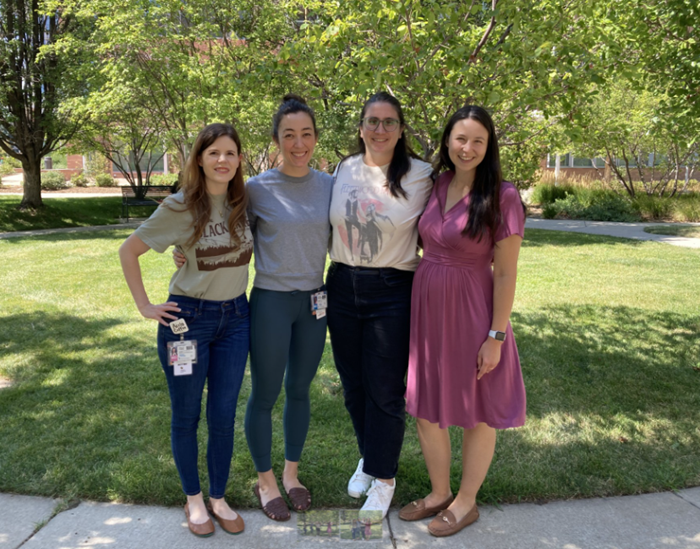
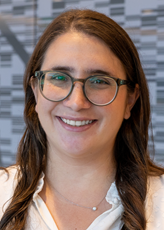
Alex Berardi-Bloomfield, MD – Pediatric Emergency Medicine
Alex Berardi-Bloomfield is a second-year fellow in pediatric emergency medicine. She completed medical school at New York Medical College and residency at New York-Presbyterian Weill Cornell where she completed an additional year as chief resident. Fellowship
at CHCO is the first time she's lived off the east coast!
Her scholarly interests currently lie in medical education. Her current project is curriculum development of psychiatric emergency medicine for PEM fellows. Given the growing mental health crisis for our pediatric population, there is a growing need for
providers to be able to address acute mental health chief complaints, specifically in the emergency room setting. Alex hopes to start a curriculum to help disseminate this training.
She is excited to be a part of SEELS which she finds to be an inspiring group of trainees and faculty who strive to make medical education effective and meaningful.
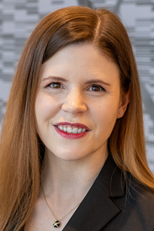
Ashley Cowan, MD – Perinatal-Neonatal Medicine
Dr. Ashley Cowan is a second-year neonatal-perinatal medicine fellow at the University of Colorado and a graduate student in the Master of Education program at the University of Cincinnati. She completed medical school in Texas, residency in Southern California, and spent a few years working as a NICU hospitalist in Hawaii before deciding to pursue fellowship in neonatology and her master’s degree in education.Dr. Cowan’s research interests include artificial intelligence, wellness, and education leadership. Her scholarly project aims to explore the benefits and limitations of using artificial intelligence’s large language models in medical education
The SEELS program has provided community, mentorship, scholarly support, and invaluable insight into the career opportunities medical education can provide. The educational sessions provide knowledge and skills laying a strong foundation for future careers in medical education.
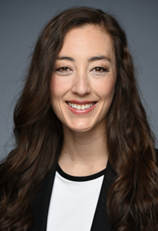
Jessica Frelinger, MD – Pediatric Critical Care Medicine
Dr. Jessica Frelinger is a second-year pediatric critical care medicine fellow. She completed medical school in Chicago at Rosalind Franklin University of Medicine and Sciences before completing her pediatric residency and chief year at Children’s Hospital Los Angeles. Her scholarly interests generally include medical education and the role that gender plays in the clinical learning environment.
With the guidance of her research mentor, one of her current projects explores how the gender of pediatric critical care fellows influences the learning experience of leading interprofessional teams during acute resuscitations and code events in the pediatric intensive care unit. She is also exploring gender-related differences in leadership assessments among pediatric subspecialty fellows.
Dr. Frelinger is excited about the SEELS program because of the formalized longitudinal curriculum offered for fellows pursuing careers in medical education, mentorship from medical educators across differing subspecialties, opportunities for learning about applications of research methodology in medical education, and, of course, community!
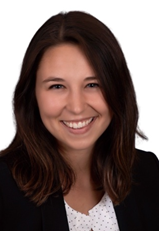
Kacie Rytlewski, MD – Pediatric Infectious Diseases
Dr. Kacie Rytlewski is currently a second-year fellow in Pediatric Infectious Diseases. She is originally from Indiana where she attended IU School of Medicine. She then went to University of Iowa Stead Family Children's Hospital for Pediatric Residency where she stayed for a year as Chief Resident. During chief year, she discovered a passion for medical education, particularly adapting game-based learning techniques for pediatric residents such as Jeopardy board reviews and educational escape rooms. Dr. Rytlewski joined SEELS to further explore research in medical education and continue to form a MedEd community.
It is within the realm of game-based learning that Dr. Rytlewski's medical education interests lie. Her SEELS project is studying educational escape rooms currently in use during academic half days for pediatric residents at CHCO and the reasons behind their perceived effectiveness. This research will hopefully help further the implementation of game-based educational strategies, particularly amongst pediatric residents.
2025-27 SEELS Cohort
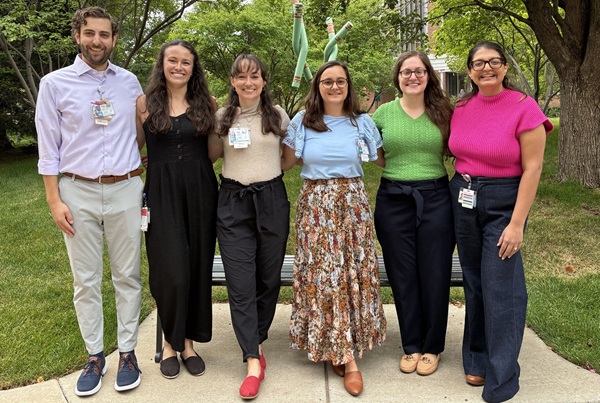
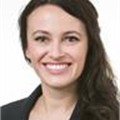
Alexandra Collel, MD – Pediatric Critical Care Medicine
Dr. Alexandra Collell is a second-year fellow in pediatric critical care medicine. Originally from Southern California, she moved to the East Coast to attend Albany Medical College in New York. After earning her medical degree, she moved to Denver, Colorado, where she completed her pediatric residency before pursuing a fellowship in pediatric critical care medicine.
Dr. Collell’s academic interests include end-of-life care and medical education. She is particularly focused on assessing how trainees navigate serious conversations with patients and families, with an emphasis on communication skills.
As a part of the SEELS Program, she looks forward to connecting with a community of medical educators, deepening her understanding of research methods, expanding her mentorship network, and exploring career pathways within medical education.
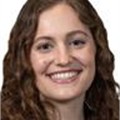
Julia Kozlowski, MD – Pediatric Hospital Medicine
Dr. Julia Kozlowski is a first-year fellow in pediatric hospital medicine. She grew up in sunny South Florida before moving all over the country for her education, starting with Duke University in North Carolina for her undergraduate studies. She completed medical school at the University of Michigan before graduating from Pediatric Residency at the University of Colorado with a certificate in medical education. Fellowship is the very first time she’s elected to stay in the same place for her education, and she is thrilled to be continuing her training at Children’s Hospital Colorado.
Dr. Kozlowski’s scholarly interests currently lie in medical education. Specifically, she is passionate about promoting a growth mindset amongst learners and creating psychologically safe clinical learning environments to facilitate learners’ autonomy and development as growing physicians. Her current project aims to explore how the structure of pediatric hospital medicine teams impacts the learning experience for clinical students. This work is particularly important as the number of residents on inpatient pediatric teams has decreased due to changes in ACGME pediatric residency requirements; thus, some institutions and placing students on non-resident or non-traditionally structured teams for their inpatient pediatric rotations. It is essential to understand how these different team structures affect students’ clinical experiences, as inpatient pediatric rotations are an essential part of their education.
Dr. Kozlowski is excited to participate in the SEELS program so that she can grow as both a clinical teacher and educational scholar through its longitudinal curriculum and diverse network of inspiring peer mentors and faculty mentors who are leaders in medical education across specialties and disciplines.
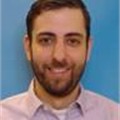
Samuel Lazaroff, MD – Pediatric and Adult Rheumatology
Dr. Sam Lazaroff is a third-year combined pediatric and adult rheumatology fellow. He completed medical school at The Ohio State University COM and Med-Peds residency at Vanderbilt University. He has a longstanding interest in medical education, having completed resident-as-teacher programs through both Internal Medicine and Pediatrics during the first phase of his training.
He joins SEELS with the goal to bolster his educational scholarship in addition to clinical and didactic-based teaching. Blending his interests in healthcare transition and medical education, he is planning to design a project to identify (and fill) gaps in adult rheumatologists’ understanding of childhood-onset rheumatic diseases. As more and more of these individuals survive into adulthood, it remains crucial for rheumatologists in the adult healthcare sphere to have the knowledge and skills to care for this vulnerable patient population. He is excited to find camaraderie and mentorship in the SEELS and broader CU community!

Haley Myers, MD – Pediatric Nephrology
Haley Myers is a second-year fellow in pediatric nephrology. She completed medical school at University of Wisconsin Madison and pediatric residency at Michigan State University at Helen DeVos Childrens Hospital in Grand Rapids, MI. She also became a certified culinary medicine specialist during residency. She is excited to be in fellowship in the mountain west at a large academic program!
Her scholarly interests are in medical education and nutrition education for patients, families and medical trainees. Her scholarly project is assessing patients and families preferences on receiving education related to their therapeutic diet and how we can better serve the renal community related to their dietary restrictions.
She is excited to be a part of SEELS program to help develop a career in medical education. She is thankful and excited for the career mentorship that is incorporated into the program!

Juhee Patel, DO – Pediatric Pulmonary Medicine
Dr. Juhee Patel is a pediatric pulmonary fellow at Children’s Hospital Colorado. She completed her pediatric residency at Lehigh Valley Health Network, where she was recognized with both the Resident Advocacy Award for her commitment to advancing health, equity, and inclusive excellence and the Pulmonary Achievement Award for her clinical and academic achievements in pulmonary medicine.
Her scholarly interests center on professional identity formation in medical education, with a particular focus on how longitudinal integrated clerkships influence specialty choice and contribute to addressing workforce needs. She has been actively engaged in medical education scholarship through her work with the Coalition for Physician Accountability’s UME-GME Review Committee and has published on transitions in medical training in Academic Medicine and the Journal of Osteopathic Medicine.
Through SEELS, Dr. Patel aims to deepen her skills in educational scholarship and leadership, develop frameworks for evaluating professional identity formation, and collaborate with peers and mentors to translate her research into meaningful improvements in medical education.
.jpg?sfvrsn=86e2f4b4_0)
Julia Sessions, MD – Pediatric Gastroenterology, Hepatology, and Nutrition
Dr. Julia Sessions is a second-year pediatric gastroenterology, hepatology, and nutrition fellow. She is from Northern California and completed her undergraduate degree at the University of Michigan (Go Blue!), medical
school at Stanford School of Medicine, and pediatric residency at the University of Virginia. She became interested in medical education during her chief resident year and is excited to be a part of the SEELS program
to gain formal training in education leadership, connect with likeminded pediatric fellows, and receive mentorship from educators across different subspecialties.
Her scholarly interests include medical education, eosinophilic esophagitis, and procedural training for gastroenterology fellows. Her current education project is focused on curriculum development for the relatively
new un-sedated transnasal endoscopy. This technology was developed at the Children’s Hospital Colorado and is now considered standard of care as an endoscopic option for esophageal assessment in pediatric
eosinophilic esophagitis and can replace sedated upper endoscopy in the right patient population. Besides education work, she also does eosinophilic esophagitis translational research and has prior work and research
experience in global health.
Julia Sessions, MD – Pediatric Gastroenterology, Hepatology, and Nutrition
Dr. Julia Sessions is a second-year pediatric gastroenterology, hepatology, and nutrition fellow. She is from Northern California and completed her undergraduate degree at the University of Michigan (Go Blue!), medical school at Stanford School of Medicine, and pediatric residency at the University of Virginia. She became interested in medical education during her chief resident year and is excited to be a part of the SEELS program to gain formal training in education leadership, connect with likeminded pediatric fellows, and receive mentorship from educators across different subspecialties.
Her scholarly interests include medical education, eosinophilic esophagitis, and procedural training for gastroenterology fellows. Her current education project is focused on curriculum development for the relatively
new un-sedated transnasal endoscopy. This technology was developed at the Children’s Hospital Colorado and is now considered standard of care as an endoscopic option for esophageal assessment in pediatric
eosinophilic esophagitis and can replace sedated upper endoscopy in the right patient population. Besides education work, she also does eosinophilic esophagitis translational research and has prior work and research
experience in global health.
2023–25 SEELS (Founding) Cohort
Graduated on May 22, 2025
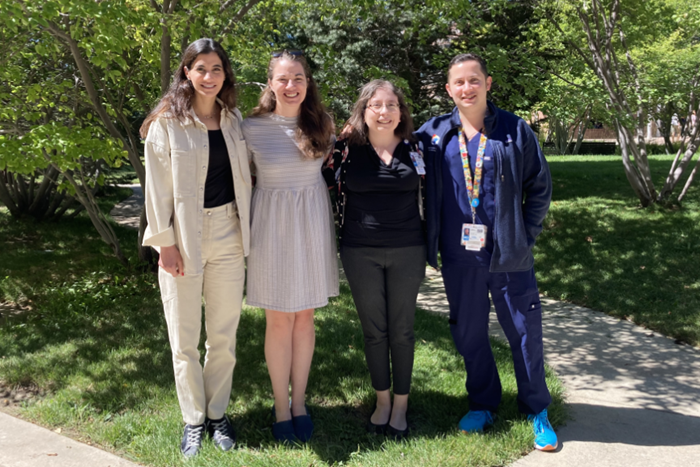
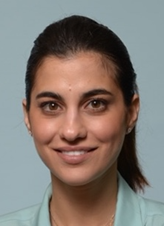
Maria Abou Nader, MD – Pediatric Critical Care Medicine
Project Title: "Exploring the Educational Needs of Pediatric Residents in Lebanon Related to the Care of Children with Congenital Cardiac Lesions"
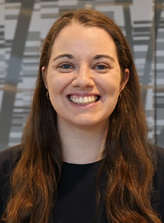
Alison Celello, MD – Pediatric Hematology/Oncology
Project Title: "Assessing the Needs of Pediatric Oncology Providers Caring for Refugee and Migrant Patients"
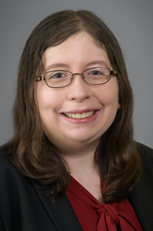
Cristina Saez, MD – Pediatric Rheumatology
Project Title: "Assessing Educational Needs of Pediatrics Residents in Outpatient Pediatric Rheumatology"
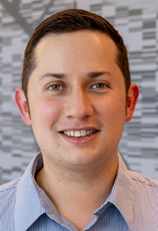
Pablo Napky Raudales, MD – Pediatric Critical Care Medicine
Project Title: "Jack of Which Trades? Learning How to Care for Critically Ill Children as a Pediatric Resident in Honduras."
The application deadline is generally in February.
Applicants will be notified of the selection committee’s decision by April.
The August 2026 – January 2028 Cohort will begin with orientation in August 2026.
Mandatory, in-person, monthly educational sessions are currently planned for the first Tuesday afternoon of the month from 1-5pm.
All pediatric fellows completing 3-year ACGME-accredited fellowships within the Department of Pediatrics at the University of Colorado School of Medicine are encouraged to apply. We will consider fellows starting a 2-year ACGME-accredited fellowship in July, if a scholarly component is required for the fellowship and the program director guarantees the time and resources for SEELS program participation requirements. Selection will be based on academic career goals, balance of educational needs, and diversity.
Please submit your application online using the following link. Applications are due on February 16, 2026.
Fellow Application Information and Questions:
- Name
- Fellowship Training Program
- Fellowship Program Director
- Year in fellowship as of July
- Why are you applying to the SEELS Program, and what do you hope to gain by becoming a SEELS scholar? What would be the impact if you did NOT participate in SEELS? Please include a description of any prior training in medical education (for example, a certificate training program or education pathway during residency) and future academic career goals (for example, leadership positions, scholarship goals, or Master programs) related to medical education. 500 word maximum
- What mentorship do you currently receive (for example, in the medical education research/scholarship, leadership, and/or career development domains)? Current mentors may be local or from other institutions. What are your mentoring needs or gaps for which the SEELS Program may fulfill, and why? 300 word maximum
- What medical education project or scholarly idea do you have for completion during the SEELS Program? Please include background information, such as your motivation to complete this project and any relevant literature, project goal(s)/aim(s), and stage of development. 300 word maximum
- Do you have a primary research mentor identified for the medical education project/idea described in the prior question, or would you need help identifying a primary research mentor for this project/idea? If you have a primary research mentor identified, please share their name, institution, and role(s). It is NOT required to have a mentor selected before starting SEELS and does not impact your application.
- The University of Colorado School of Medicine is committed to supporting a body of diverse learners and faculty who value belonging and inclusiveness. The SEELS Program is also dedicated to creating an welcoming learning environment that promotes respect from the classroom to the bedside. How would you enhance this mission for the SEELS Program and/or the University-at-large? 300 word maximum
- Do you have funding from your fellowship program for conducting a research project?
- Do you have funding from your fellowship program for attending conference(s)?
- The SEELS Program currently meets in-person on the first Tuesday of the month from 1-5pm. Please provide any conflicts that you would have during this time, and list any other times that you have other mandatory, recurrent meetings or conflicts (for example, clinic schedule or Section meeting on the second Wednesday of every month from 1-5pm). **Answers to this question are used for planning purposes and do not impact one's acceptance into the Program.**
Curriculum Vitae: Please highlight specific education-related experiences. Upload as an attachment within the electronic application above.
Letter of Recommendation from Fellowship Program Director Instructions:
- Please describe why the fellow should be selected, based on characteristics, career goals, accomplishments-to-date, program/division availability for mentorship, gaps in training, etc.
- Please explain how the SEELS Program will enhance the fellow's training and if the fellow has identified a primary research mentor for their medical education scholarly project. It is not required to identify this mentor ahead of time; in which case, please describe the specific role(s) that the PD would envision the SEELS Program faculty mentors having for the fellow (e.g. serving as the primary research mentor, serving as the educational co-mentor on a mentorship team, coaching or advising on the project, etc).
- Please provide your support that the fellow's proposed scholarly project for SEELS would serve as their fellowship's scholarly activity requirement or explain if that cannot be the case.
- For 2-year fellowships, please also describe in detail the scholarly requirements for the fellowship and the structure of the fellows' scholarly time during the 2 years (e.g. protected time, mentorship, etc).
- Please include a statement of support, such as: “I support the application of [insert fellow’s name] to the SEELS Program. I agree to provide the protected time for [insert fellow’s name] to attend mentorship meetings, orientation, and SEELS’ monthly educational sessions, during which the fellow will be unavailable for clinical, Section, or other duties. In addition, I understand that [insert fellow’s name] may need to be available on other dates/times to attend conferences or other learning opportunities as part of the SEELS Program. I will offer or help facilitate the mentorship needed for [insert fellow’s name] to complete the SEELS Program.”
- Please email letter of recommendation directly to [email protected] by February 16, 2026.
If you have any questions about the SEELS Program or application, please contact [email protected].